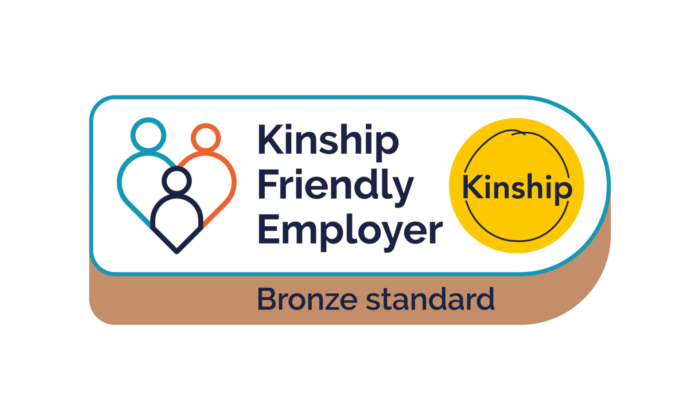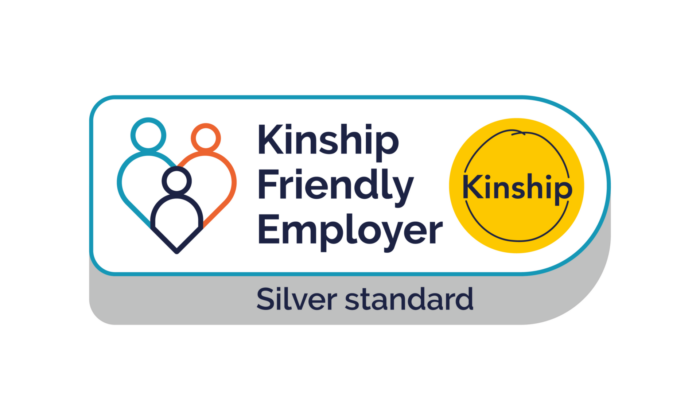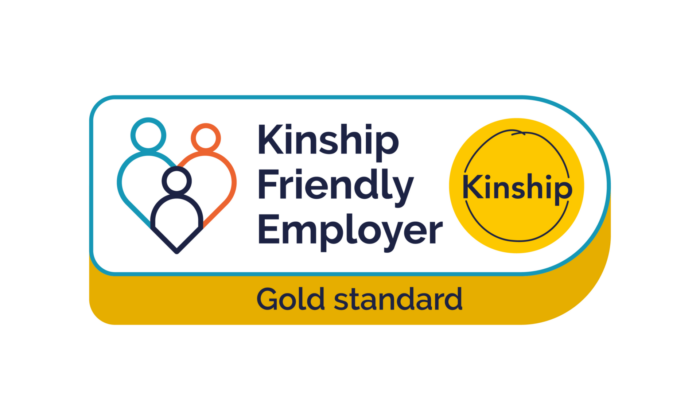
Kinship carers are family or friends who step up, often during an unexpected crisis, to care for a child when their parents aren’t able to.
Become a Kinship Friendly Employer to support your colleagues to care for children they love.
Register for our free Kinship Friendly Employer toolkit
Click on the link below to take you to the section you'd like to read:
In our Forced Out report, based on a survey of over 500 kinship carers, 68% of respondents said their employer didn’t offer support to kinship carers. More than 4 in 10 (41%) kinship carers told us they had to leave work permanently and further 45% were forced to reduce their working hours.
However, when employers do support kinship carers in their workforce it can make a massive difference.
Katie, a special guardian employed by cardfactory, said:
“I was given immediate trust and told that as long as the work got done everything was fine. That made a massive difference to me. [cardfactory] are an inclusive, friendly employer, and they didn’t hesitate to extend paid leave to kinship carers. There’s no reason why kinship carers shouldn’t have parity with adopters or birth parents when it comes to paid leave.”
Our Kinship Friendly Employer scheme has been set up to provide a free framework and toolkit to help any employer – from any sector and of any size – to follow cardfactory’s example and introduce Kinship Friendly policies.
These policies will support kinship carers in the workforce who want to stay in work to maintain their income, job security and career prospects whilst stepping up to take on caring responsibilities for children they love.
By becoming a Kinship Friendly Employer, you will be publicly recognised as an organisation that wants to support their employees with balancing their work whilst looking after their children. The Kinship Friendly Employer scheme is a new initiative. By joining, you will be seen as leading in your sector as an inclusive and supportive employer. This will lead to less workforce attrition and a happier, more committed and loyal workforce. Kinship will work with you to:
Any organisation can become a Kinship Friendly Employer by using Kinship’s resources and support to introduce kinship friendly policies.
Given the current absence of a statutory underpinning for kinship employment policies, particularly paid kinship care leave, the Kinship Friendly Employers Scheme enables employers to seize the initiative. Our Kinship Friendly Employers scheme supports employers to introduce kinship friendly policies, procedures and support for their colleagues that can be accommodated by their individual organisation.
As a starting point, you can access our free Kinship Friendly Employer toolkit by filling out the request form below. We will then send you an introductory email and the toolkit which includes template policies, checklists, and guidance for HR and line managers.
Kinship has developed gold, silver and bronze tiered standards for employers, based on the scope and extent of their kinship friendly policies. We have produced checklists of policies for each standard, summarised below. This is to allow an organisation to cross-reference existing and new policies to ascertain what standard they will be recognised at as a Kinship Friendly Employer by us.
Meeting these standards and being recognised as a kinship friendly employer will demonstrate to your workforce, suppliers, stakeholders and prospective employees that you value, understand and support kinship carers. You will receive recognition from us, as the leading kinship care charity, for meeting a high threshold of support.
Acknowledging the lack of statutory underpinning for kinship carers in the workplace, Kinship welcomes all employers making an effort to recognise, value and support kinship carers in their workforce. Over time, an employer could move up through the tiers, perhaps as they develop new policies or are able to make business cases for increasing provisions available for kinship carers.



We are working with some trailblazing employers who have become our first Kinship Friendly Employers. We have produced the case studies below with them to help guide other organisations who want to join the scheme on the measures they can introduce.
Representatives from B&Q and its parent company, Kingfisher, attended an employer roundtable with Kinship and the Department for Education in November 2023 to discuss the importance of providing support for kinship carers who are raising the child of a family member or friend.
Following the event, B&Q launched its first Kinship Carer Leave Policy, dedicated to supporting and reassuring colleagues who find themselves in a situation where they are due to become the primary caregiver to a child in unexpected circumstances.
With the launch of this policy, B&Q has become the first major high-street retailer to become a Gold Standard Kinship Friendly Employer, mirroring its enhanced adoption pay with eligible colleagues entitled to 6 weeks at 100% pay and 33 weeks at 50% pay. In addition, B&Q has extended its 4 weeks enhanced paternity leave and pay to colleagues who are secondary kinship carers, if their partner is taking on the primary care responsibility.
One of B&Qs colleagues, Ceri who is a kinship carer to her niece’s daughter was able to take advantage of this policy straight away.
“During my period of leave, I had the opportunity to not only focus on bonding my new family, caring for a newborn, but also time to navigate through various challenges, including assessments, hearings, attending court and numerous interactions with social services and other professionals.
“Knowing that I was receiving kinship pay allowed me to focus entirely on these crucial aspects without the added worry of financial strain. This stability and time has been invaluable in allowing me to prioritise my family well-being throughout these demanding circumstances without the added stress of work and financial responsibilities.
“I am inspired by B&Q’s inclusivity and core values and profoundly grateful for the understanding and support shown to me.”
B&Q used our Kinship Friendly Employer toolkit which supported them in drafting its policy. B&Q’s sister company Screwfix is launching its policy later in the year and Kingfisher hope to follow suit in the future.
BKL are our newest gold-standard Kinship Friendly Employer. They introduced their refreshed Family Friendly policies in July 2024 which included matching their paid kinship carer leave to that of statutory adoptive leave for all kinship carers – both those with and without a legal order.
“At BKL, we understand that the moments that matter in our colleagues’ lives are unique and significant. Our commitment to supporting all families, no matter how they start, is reflected in our Family Friendly Policies.
These policies are not rules; they are an articulation of our dedication to our people. This mindset guides us as we create policies that help our colleagues balance work and life, ensuring they feel valued and supported during these important times”
Greg McCaw, Chief People Officer
cardfactory introduced kinship leave in 2022 to complement and enhance their approach to family friendly policies, recognising the diverse needs of our colleagues. They offer kinship carers the same enhanced leave entitlements as maternity, adoption and shared parental leave policies to provide an inclusive family friendly offering.
“At Correla, we know that all families are different.
We already have an inclusive parental leave policy which offers 26 weeks’ fully paid leave for birth, adoption, surrogacy and long-term fostering. It is gender neutral and includes those who identify as male, female, non-binary and same sex families.
Standing by our principle that we want our benefits to be inclusive, we also offer Kinship Carer Leave that mirrors our parental leave.
Becoming a kinship carer can happen suddenly, and often at a time of crisis. Being a kinship carer makes a huge difference to children’s lives, but it can also be challenging practically, emotionally and financially. Correla recognises how important family is and how becoming a kinship carer can be incredibly difficult. We therefore aim to be as supportive and flexible as we can.
We are proud to be one of the first organisations to do this and to be a Gold Standard Kinship Friendly Employer.”
The Education Alliance (TEAL) have introduced paid kinship care leave for any employee caring for the child of a family member or friend that is equal to the organisation’s adoption leave and pay. Their support also includes providing information to kinship carers and signposting them to where they can access further help and information.
“Supporting our colleagues who are kinship carers by providing full rights to paid adoption leave is important for us as a trust. We want working at TEAL to be compatible with a full and happy life outside work so providing paid leave when people need it the most is an essential part of that.
Too often, the extraordinary work kinship carers do is overlooked so we are proud to be part of a growing community of employers seeking to ring positive change.”
Jonny Uttley, The Education Alliance CEO
Lloyds Banking Group knows that flexibility, family and wellbeing are important, and now their employees can benefit from the introduction of Kinship Friendly policies. The policy was introduced in February 2023 and offers paid kinship care leave, on par with adoption leave, for any employee taking on a permanent primary caring responsibility for a child. Carers have access to 52 weeks’ of leave, 26 weeks’ at full pay and 13 weeks’ at the statutory rate of pay for adoption leave.
Kinship care often starts in crisis; there is no time to prepare or make plans. Lloyds Banking Group’s policy means that from the moment an employee gets a phone-call asking them to take on the care of a child and become a kinship carer, they know that they will be supported and able to take the time to adjust to their new life.
To date, five kinship carers have been able to take advantage of Lloyds Banking Group being a Gold Standard Kinship Friendly Employer, enabling them to spend vital time with their growing family at the start of their kinship care journey.
“We’re really proud to support our kinship carers and create a workplace culture that values inclusivity and helps put people first. By providing our kinship carers with access to adoption leave and the same benefits as our other new parents, we are doing what’s right in those key moments that matter.” Nicky Elford, Head of Colleague Propositions, Lloyds Banking Group
The thinking behind including kinship carers in Surviving Economic Abuse in their updated Family Leave Policy was to give them the same rights as people who adopt/foster. They have introduced paid leave for kinship carers at the same level as statutory adoption leave.
As an organisation working in the domestic abuse sector, they are very mindful that children may be cared for by family members/friends because it might not be safe for them to live at home with an abusive parent, or because an abusive parent has killed their mother or father and is now in prison.
In September 2023, Tesco – the UK’s largest private-sector employer – granted colleagues who have a special guardianship order (SGO) to care for relatives’ children equal rights with colleagues who adopt – giving them both 26 weeks’ leave on full pay.
Kinship greatly welcomes this move and estimates that hundreds of kinship carers work for Tesco. Our CEO, Dr Lucy Peake, said about Tesco’s initiative:
“We are thrilled that Tesco is stepping up for kinship carer special guardians in its workforce by introducing paid kinship care leave on a par with adoption leave.
“Tesco’s new policy will make an enormous difference to many special guardian kinship carers across the country, who will now be able to take paid time off when to support children who have often experienced trauma and focus on their needs, knowing they will have a job to return to.
“We’re very proud to be working with Tesco as they implement this industry-leading support for special guardians and hope over time it can extended to all kinship carers. We urge other retailers to follow their lead and will soon be launching our Kinship Friendly Employers scheme to encourage employers of all sizes to better support kinship carers in the workforce”.
Taylor Kershaw, who works in the Employer Brand team at Tesco, found her life turned upside down when she stepped up at the age of 25 to look after her brother’s newborn daughter.
Taylor was able to raise awareness of the issue facing kinship carers with colleagues in the Tesco People team, which led to the new policy being introduced. Taylor said:
“This is a gamechanger for all colleagues facing up to such a major life change. I was just 25 years old when I stepped up to become a guardian to a child that was only five days old.
“I was heartbroken for my brother and his partner, but suddenly I had to navigate becoming a guardian while still living at home and working full-time. This leave would have taken a lot of pressure from my shoulders and given me time to bond with baby and settle into my new role.”
James Goodman, Tesco UK People Director, said: “Relatives who take on the care of a child often feel forced to reduce their hours or even leave their jobs as they try to juggle extra responsibilities, and we wanted to step up to offer kinship carers the same support as colleagues who adopt a child.”
Register now via the form below and we will send you an introductory email and the toolkit, which includes template policies, checklists, and guidance for HR and line managers.
Sign up for emails to keep up to date with the information that’s important to you, from support and advice for kinship carers, to our latest news, events and campaigns.